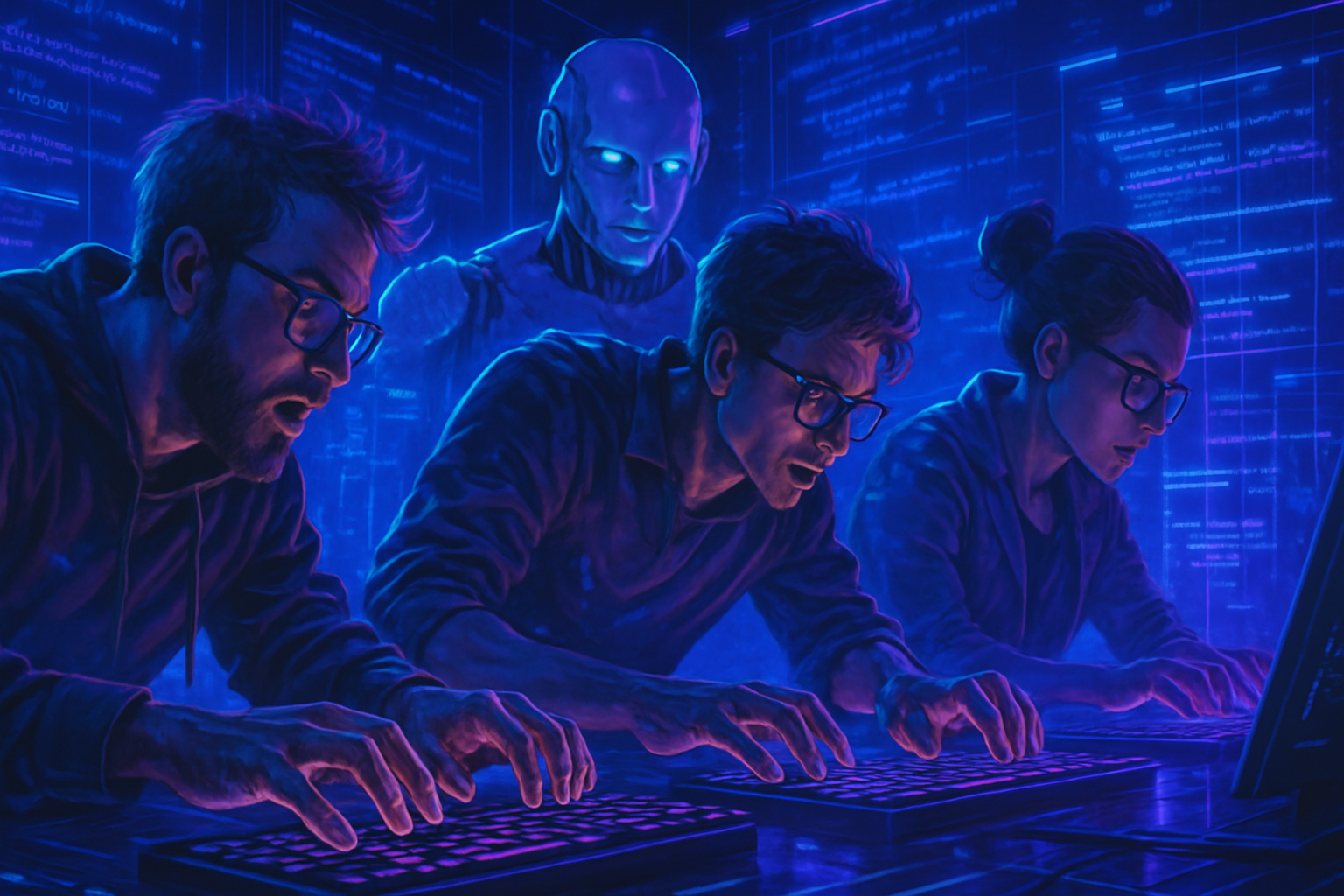Coding competitions reveal a fierce struggle between man and AI. Humans still show a slight superiority in this field, despite the growing influence of algorithms. This context raises crucial issues for the future of jobs related to software development.
Human problem-solving skills remain unmatched, even in the face of the technological prowess of artificial intelligences. Recent events, such as the finals of the AtCoder World Tour, illustrate this reality and expose societal concerns.
The interaction between technological innovation and human expertise questions the foundations of the IT profession. This ongoing challenge prompts reflection on the future of coding and the role that humans will continue to play in a world increasingly dominated by AI.
A Close Human Victory
Przemysław Dębiak, known by the pseudonym Psyho, recently won the coveted title at the AtCoder World Tour 2025 finals in Tokyo. His confrontation with the algorithm developed by OpenAI revealed that, for now, humans maintain a slight edge in competitive coding. This triumph underscores the persistence of human ingenuity in the face of an evolving artificial intelligence.
The Analytical Abilities of Humans
Psyho, forty-one years old and a former employee of OpenAI, updates the debate on supremacy between humans and AI. He states that, despite the rapid rise of AI, human programmers remain significantly more skilled at reasoning and solving complex problems. His victory attests to this, but Dębiak acknowledges that the pace of technological advancement could quickly reverse the trend.
The Tournament and Its Stakes
The contest, which lasted ten hours, involved solving a complex optimization problem, reminiscent of the famous traveling salesman problem. This challenge requires determining the shortest route between various locations. While these statements may seem straightforward, arriving at an optimal solution is a true puzzle for intelligences, whether human or artificial.
The Speed of AI
Psyho notes that humans, even the most talented, face a speed limitation in writing code. Artificial intelligences, on the other hand, can perform multiple adjustments at a remarkable speed. AI acts like a multitude of individuals working simultaneously, allowing it to optimize results more effectively than humans.
The Technology Paradox
The rise of AI in the coding sector elicits ambivalent feelings among programmers. Psyho shares his concerns about misinformation, social impact, and the danger of a loss of meaning among individuals. The many issues triggered by the implementation of AI challenge industry players, raising fundamental ethical questions.
An Uncertain Horizon
As major tech companies, such as Meta and Microsoft, invest heavily in automated coding, the future of office jobs appears precarious. Dario Amodei, CEO of Anthropic, predicts that AI could absorb up to 20% of positions in this sector within the next five years. Psyho emphasizes that “all jobs are affected” by this technological revolution, indicating a profound change underway in the world of work.
Advancements in AI and Future Perspectives
The growing capabilities of artificial intelligences compel a constant redefinition of performance criteria. The relationship between man and machine thus becomes subject to reevaluation. OpenAI’s latest study, focusing on the assessment of artificial intelligence agents’ performance, illustrates this ongoing quest for optimization. The evolution of AI in 2025 unfolds on a horizon where optimization and information sharing thrive.
Coding competitions reflect a turning point in the relationship between human and artificial intelligence. As the accomplishments of artificial intelligences reach their peak, the successes of human programmers remain a testament to human ingenuity. This precarious balance remains the focal point of a debate that will continue in a world where technology advances at a breakneck speed.
Frequently Asked Questions about the Impact of Coding Competitions on Human and Artificial Intelligence
How do coding competitions highlight human abilities compared to AI?
Coding competitions reveal that, even though AI emerges as a powerful tool, the best human programmers maintain an advantage in complex reasoning and problem-solving.
What are the reasons why humans are still superior to AI in coding?
Humans demonstrate a creativity and adaptability that allow them to intuitively solve problems, whereas AI, although fast, is limited in its ability to exhibit this level of reasoning.
Do technological advancements threaten the place of human programmers?
Yes, the rise of AI in coding raises concerns about diminishing job opportunities for programmers, but unique human skills remain essential in many contexts.
What differentiates the performances of humans and AI during coding competitions?
The difference primarily lies in execution speed and the ability to quickly adjust code, but strategic approaches and human insights often lead to more effective solutions.
How do coding competitions influence the evolution of AI in software development?
These competitions provide valuable data for improving AI algorithms, which could lead to more efficient systems, but also highlight areas where human intelligence remains indispensable.
Can programmers adapt to the rise of AI in coding?
Yes, programmers can diversify and develop new skills by focusing on areas where human expertise, such as creative design and complex decision-making, remains crucial.
What is the perspective of experts on the future of coding competitions in the face of AI?
Experts believe that coding competitions will continue to evolve but will also become a testing ground for human capabilities against increasingly efficient AIs.
Should programmers fear the domination of AI in coding in the future?
While they should acknowledge the potential of AI, programmers should not fear this evolution but rather prepare to coexist with these technologies to make the most of them.






